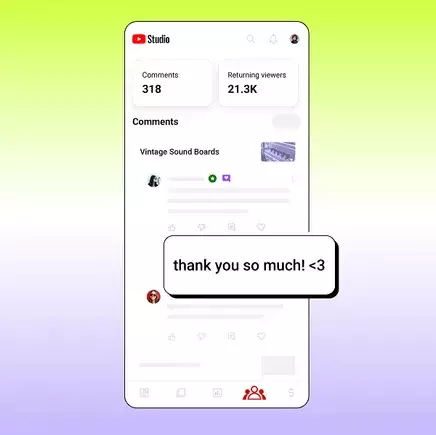In today’s rapidly evolving digital landscape, technology is carving new pathways for interaction, particularly within social media. YouTube recently announced an innovative move to introduce AI-powered reply suggestions designed to aid creators in managing comments more efficiently. While at first glance, this initiative may appear beneficial for creators overwhelmed by their followers’ input, it raises significant concerns about the potential depersonalization of online interactions. The industry must grapple with a critical question: at what point does technological assistance become detrimental to the authenticity of social engagement?
YouTube’s latest feature aims to streamline the process of responding to user comments by utilizing AI to generate tailored suggestions that reflect a creator’s unique tone and style. The AI learns from a creator’s previous engagements to provide suggestions that creators can edit before responding, creating the illusion of personalized interaction. This concept isn’t entirely novel; similar functionalities have been seen in email platforms like Gmail with their predictive text features. Nevertheless, the implications of employing such technology in social media merit careful examination.
The potential advantages of this AI-enhanced tool include saving creators considerable time and ensuring that they remain engaged with their audience, especially for those with a significant number of followers. In principle, using AI to manage high volumes of comments could foster greater interaction, as more creators might find consistency in replying to audience inquiries. However, the broader implications of such technologies reveal an unsettling trend toward commodifying human expression.
One of the primary concerns regarding YouTube’s initiative is its potential to diminish the authenticity of interactions between creators and their fans. The essence of social media lies in genuine connection—authentic exchanges that foster community and shared experiences. Yet, by automating responses, platforms risk eroding the very foundations that make these relationships meaningful. If creators resort to AI-generated replies, the risk grows that interactions may feel hollow or insincere, akin to speaking to a chatbot rather than a real person.
Furthermore, the prevalence of automated responses in discussions might lead users to retreat into more isolated chat groups, seeking authenticity in smaller settings away from the larger social media platforms. As interaction quality declines, users might disengage from broader conversations, leading to a fragmented social media experience where genuine engagement becomes progressively rare.
The introduction of AI-driven engagement tools further exacerbates the concern of bot-mediated communications. Platforms like YouTube and Meta are inadvertently paving the way for a future where human interaction is interlaced with algorithmically driven replies. As bots proliferate, users may experience increased frustration due to overly automated engagement that lacks personal touch. Many individuals already encounter issues with unsolicited bot replies in direct messages or streams, creating a landscape rife with misconceptions and triviality.
While the intent behind these AI advancements often aligns with increasing efficiency, they simultaneously dilute the core component of social media: genuine human interaction. As automations become more seamless and sophisticated, users may overlook the underlying fact that they are engaging with algorithms rather than real people. This erosion of the social fabric could lead to widespread disillusionment with online platforms and a retreat toward more personal interaction spaces.
While YouTube’s initiative to test AI-generated comment replies seeks to address challenges faced by creators in engaging with their audiences, it also presents a paradox of efficiency versus authenticity. The benefits of streamlined interactions come with the risk of commodifying human connections, rendering them less genuine and more mechanical. As digital communication continues to evolve, social media platforms must tread carefully, advocating for solutions that prioritize meaningful interactions without relinquishing the authentic experiences that users cherish. Ultimately, the balance between technological progress and preserving human connection will determine the future landscape of social engagement in a world increasingly dominated by AI.

